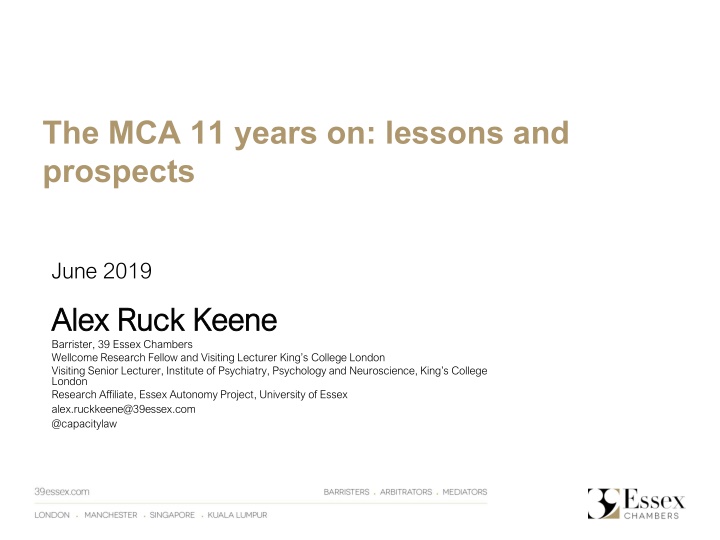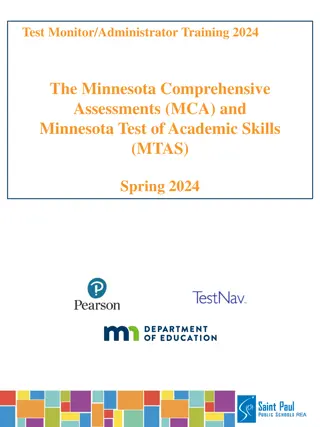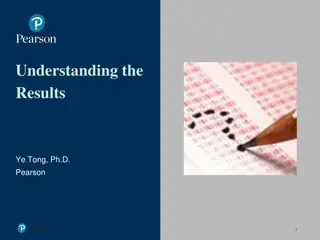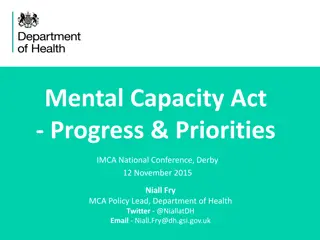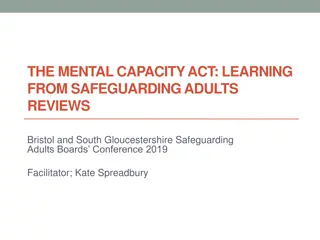The MCA 11 Years On: Lessons and Prospects
The Mental Capacity Act of 2005 was a significant legal development emphasizing individual decision-making for those lacking capacity. Insights from post-legislative scrutiny and studies highlight challenges and key areas for improvement in capacity assessments. Considerations in assessments, disagreements, and resources for further guidance are discussed, shedding light on the ongoing efforts to enhance decision-making processes for vulnerable individuals.
Download Presentation

Please find below an Image/Link to download the presentation.
The content on the website is provided AS IS for your information and personal use only. It may not be sold, licensed, or shared on other websites without obtaining consent from the author.If you encounter any issues during the download, it is possible that the publisher has removed the file from their server.
You are allowed to download the files provided on this website for personal or commercial use, subject to the condition that they are used lawfully. All files are the property of their respective owners.
The content on the website is provided AS IS for your information and personal use only. It may not be sold, licensed, or shared on other websites without obtaining consent from the author.
E N D
Presentation Transcript
The MCA 11 years on: lessons and prospects June 2019 Alex Ruck Keene Alex Ruck Keene Barrister, 39 Essex Chambers Wellcome Research Fellow and Visiting Lecturer King s College London Visiting Senior Lecturer, Institute of Psychiatry, Psychology and Neuroscience, King s College London Research Affiliate, Essex Autonomy Project, University of Essex alex.ruckkeene@39essex.com @capacitylaw
The rear view mirror The Mental Capacity Act was a visionary piece of legislation for its time, which marked a turning point in the statutory rights of people who may lack capacity whether for reasons of learning disability, autism spectrum disorders, senile dementia, brain injury or temporary impairment. The Mental Capacity Act placed the individual at the heart of decision-making. [ .] The Act signified a step change in the legal rights afforded to those who may lack capacity, with the potential to transform the lives of many. That was the aspiration, and we endorse it. House of Lords Select Committee post-legislative scrutiny of MCA 2005 (2014)
What have we learnt so far: capacity can be difficult Wellcome-funded study of all reported cases where capacity either disputed or consideration by judge of capacity as part of project to develop educational tools: https://mhj.org.uk/ Key findings so far: Failures to consider practicable steps Failures to consider causative nexus Failures to identify which functional inability was relied upon Use and weigh as the most problematic area
Capacity: getting it right Assessment starts long before the meeting with P, with identification of Who should undertake the assessment What is the decision in question What is the information that is relevant to the decision What is the information that is irrelevant to the decision Location and timing Who should be present Values and assessment, especially in the context of using and weighing : King s College Hospital NS Foundation Trust v C [2015] EWCOP 80 What happens where there s disagreement?
Capacity further help And the capacity assessment guide: http://www.39essex.com/mental-capacity-law-guidance-note-brief-guide- carrying-capacity-assessments/
Flashpoints (1): capacity and vulnerability NB capacity is not so easy where a third party is involved: NB capacity is not so easy where a third party is involved: Is the adult s lack of capacity because of the impairment of or disturbance of their mind or brain? PC v NC and City of York Council [2013] EWCA Civ 478 Or the inability to take the material decision because of the presence and actions of the third party? LB Redbridge v GC [2014] EWCOP 485 the true question is whether the impairment/disturbance of mind is an effective, material or operative cause. Does it cause the incapacity, even if other factors come into play? This is a purposive construction. NCC v PB and TB [2014] EWCOP 14 If, on a proper analysis, the person has the capacity to take the decisions but they are vulnerable and at the mercy of a third party, then the Court of Protection has no role it is the High Court exercising its inherent jurisdiction Will come back to this at the end
Flashpoints (2) Fluctuating capacity Not a concept expressly addressed or provided for in the MCA 2005, although it is referred to in the Code of Practice Two different situations, calling for two different responses: A person who has a temporary impairment of their ability to make decisions, e.g. suffering from a severe urinary tract infection and in consequence of the infection suffering from confusion and/or delirium. A person with genuinely fluctuating capacity, such as a person with bi-polar disorder whose condition may lessen or become more severe over time.
Best interests as a process Clarity as to roles who is the decision-maker The person via ADRT, at which point no best interests decision to be taken - NHS Cumbria CCG v Rushton [2018] EWCOP 41 Attorney/deputy Trick question: the next of kin Collaborative process to identify best interests and accountability Clarity as to the available options: N v ACCG [2017] UKSC 22 Re RW [2018] EWCA Civ 1067 An iterative process where required calibration to the gravity and urgency of the situation Keeping under review: starting AND continuing medical treatment must be in best interests of patient: Aintree v James [2014] 1 AC 591 Guidance: https://www.39essex.com/mental-capacity-guidance-note-best-interests-april-2019/ www.bma.org.uk/canh
The approach to best interests The purpose of the best interests test is to consider matters from the patient s point of view Aintree v James [2014] 1 AC 591 Putting yourself in the shoes of P Not a what P would have done test, but if it is clear what P would have done will carry (at a minimum) very great weight absent compelling reasons to contrary Briggs v Briggs [2016] EWCOP 53 Contrast Wye Valley NHS Trust v B [2015] EWCOP 60 and East Lancashire NHS Trust v PW [2019] EWCOP 10
Standing in the shoes of P the implications The line between clinical appropriateness and best interests: University Hospitals Birmingham NHS Foundation Trust v HB [2018] EWCOP 39: it is plain that administering CPR in the event of a further collapse and giving her, albeit a very, very small chance of life, is what she would wish The consistently idiosyncratic (Wye Valley) and the pre- and post- incapacity (Briggs) Where wishes and feelings are not reliably identifiable: Abertawe Bro Morgannwg University Local Health Board v RY & Anor [2017] EWCOP 2 Circumstances under which wishes expressed: ADS v DSM [2017] EWCOP 8 The potential for the clash between past and present wishes: When past and present wishes collide: the theory, the practice and the future Eld. L.J. 2016, 7(2) 132-140
Risk and the person B v D [2017] EWCOP 15 stem cell: All life is an experiment: what good is it making someone safer if it merely makes them LB Islington v AA [2018] EWCOP 24 Basically adequate care at home, strong desire to remain vs rehabilitation support in placement
The limits of s.5 two views Re AG [2015] EWCOP 78: Local authorities must seek and obtain appropriate judicial authority before moving an incapacitous adult from their home into other accommodation. Local authorities do not themselves have power to do this
The wider view Section 5 of the 2005 Act gives a general authority, to act in relation to the care or treatment of P, to those caring for him who reasonably believe both that P lacks capacity in relation to the matter and that it will be in P s best interests for the act to be done. This will usually suffice, unless the decision is so serious that the court itself has said it must be taken to court. But if there is a dispute (or if what is to be done amounts to a deprivation of liberty for which there is no authorisation under the deprivation of liberty safeguards in Schedule A1 to the 2005 Act) then it may be necessary to bring the case to court N v ACCG [2017] UKSC 22 ( Powers, defences and the "need" for judicial sanction at www.mclap.org.uk/articles)
Deprivation of liberty the story so far March 2014: House of Lords Select Committee and Cheshire West Law Commission MCD project summer 2014-March 2017 Joint Committee on Human Rights June 2018 Independent Review of MHA 1983 December 2018 Mental Capacity (Amendment) Act 2019
The Mental Capacity (Amendment) Act 2019 in one slide Body of the Act: No MCA 1.5 or tort Revised s.4B court approval, replacement for urgent DOLS and emergency Statutory definition of deprivation of liberty Provisions relating to Court of Protection Schedule AA1: The Liberty Protection Safeguards Setting neutral and more than one setting, from age 16 Authorisation by responsible body NHS for CCG/hospitals, LA for all other cases (including self-funders and independent hospitals). Potential for delegation of some tasks to care home managers in some cases Conditions: capacity, mental disorder and necessity and proportionality (of risk to self alone) Additional scrutiny by AMCP in objection cases (and independent hospitals) (Broadly) opt-in representation and support by appropriate person/advocate (latter on all reasonable steps basis) Provisions for variation, review and renewal (1 year, 1 year then up to 3 years) (Broadly) the same interface between the MCA and MHA as under DOLS
Summary: key changes from DoLS Wider scope location and age (but query whether statutory definition will narrow cohort) Responsibilities lying with NHS bodies in some cases where do not at present The (unlikely) potential for greater role for care home managers No more urgent authorisations No more conditions (at least expressly, but in practice implicit) Necessity and proportionality rather than best interests requirement (but in practice proportionality encompasses same considerations) No more RPRs appropriate person and advocates (and watering down of advocacy duty to all reasonable steps ) Renewals
Where next? Implementation at some point in 2020 Regulations required e.g. as to knowledge and experience required for assessors Code of Practice in parallel or as part of new single Code (main Code also under review) Transition arrangements including backlog www.mentalcapacitylawandpolicy.org.uk/resources- 2/liberty-protection-safeguards-resources/
And the margins of the MCA The great safety net of the inherent jurisdiction to protect vulnerable adults: Re DL How far does it go? Southend-on-Sea Borough Council v Meyers [2019] EWHC 399 (Fam)
The existential challenge Our end of term report from the Committee on the Rights of Persons with Disabilities (October 2017) Equal recognition before the law (art. 12) The Committee is concerned about: (a) The legislation restricting legal capacity of persons with disabilities on the basis of actual or perceived impairment; (b) The prevalence of substituted decision-making in legislation and practice, and the lack of full recognition of the right to individualized supported decision-making that fully respects the autonomy, will and preferences of persons with disabilities; The Committee recommends that the State party, in close consultation with organisations of persons with disabilities [ ] abolish all forms of substituted decision-making concerning all spheres and areas of life by reviewing and adopting new legislation in line with the Convention to initiate new policies in both mental capacity and mental health laws. It further urges the State party to step up efforts to foster research, data and good practices of, and speed up the development of supported decision-making regimes.
Keeping yourself up-to-date http://www.39essex.com/resources-and- training/mental-capacity-law/ https://courtofprotectionhandbook.files.wordpress.com/2016/11/cop-jpeg.png?w=728h=1033 http://www.scie.org.uk/mca-directory/ www.mclap.org.uk www.mentalhealthlaw.co.uk www.courtofprotectionhandbook.com
